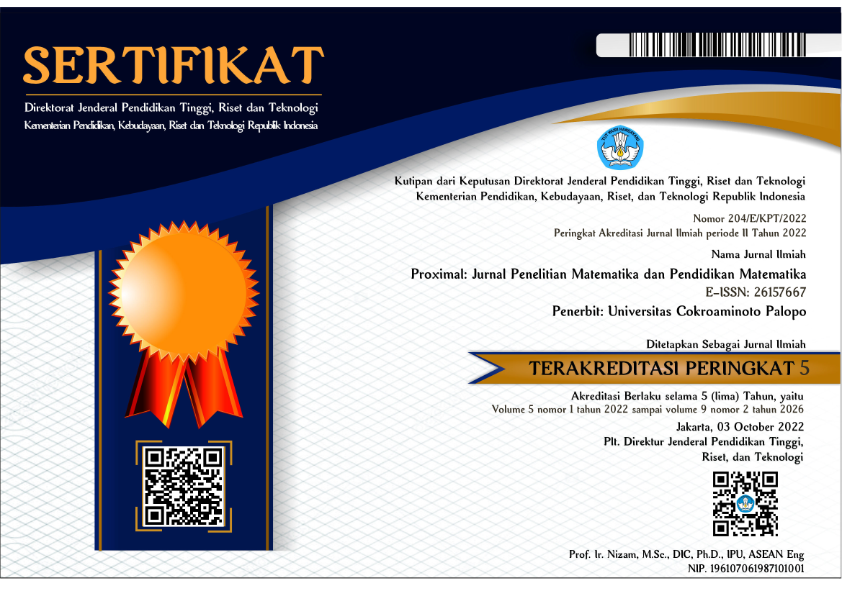PENERAPAN MODEL KOOPERATIF TIPE TEAM GAMES TOURNAMENT (TGT) TERHADAP HASIL BELAJAR MATEMATIKA SISWA KELAS VIII SMP
DOI:
https://doi.org/10.30605/proximal.v7i1.3574Keywords:
Mathematics learning outcomes, TGT type cooperative learning model, Junior high school studentsAbstract
This research aims to analyze the influence of the TGT type cooperative learning model on the mathematics learning outcomes of class VIII students at SMP Muhammadiyah Limbung. This type of research is pre-experimental with a design model, namely One-Group Pretest Posttest Design. The data collection technique uses mathematics learning outcomes test data collection techniques (pretest and posttest), and documentation. The research sample was students in class VIII.1 of SMP Muhammadiyah Limbung with a total of 35 students. Based on data processing using the t-test, it was concluded that there was an influence of the TGT type cooperative model on the learning outcomes of class VIII students at SMP Muhammadiyah Limbung. The research results showed that: the effect of improving student learning outcomes after being given the TGT model was 23.3%.
Downloads
References
Am, S. (2011). Interaksi Dan Motivasi Belajar Mengajar. Jakarta: Raja Grafindo Persada.
Amri, S. (2013). Pengembangan dan model pembelajaran dalam kurikulum 2013. Jakarta: Prestasi Pustaka.
Aris, S. (2016). Model Pembelajaran Inovatif dalam Kurikulum 2013 Cet. 2. Yogyakarta: Ar-Ruzz Media.
Damayanti, S., & Apriyanto, M. T. (2017). Pengaruh Model Pembelajaran Kooperatif Tipe Teams Games Tournament Terhadap Hasil Belajar Matematika. JKPM (Jurnal Kajian Pendidikan Matematika), 2(2), 235-244. DOI: https://doi.org/10.30998/jkpm.v2i2.2497
Darmawan, D. (2013). Metode Penelitian Kuantitatif. PT Remaja Rodakarya
Dazrullisa, D. (2018). Penerapan Model Pembelajaran Kooperatif Tipe Jigsaw Dalam Meningkatkan Kreatifitas Dan Motivasi Pada Materi Bangun Datar Sd Negeri Percontohan Banda Aceh. Bina Gogik: Jurnal Ilmiah Pendidikan Guru Sekolah Dasar, 3(1).
Jatmiko, J. (2015). Hubungan motivasi belajar dengan hasil belajar matematika siswa kelas X SMK Nahdhatul Ulama Pace Nganjuk. Jurnal Math Educator Nusantara: Wahana Publikasi Karya Tulis Ilmiah di Bidang Pendidikan Matematika, 1(2).
Nasution, S. (2008). Berbagai Pendekatan dalam Proses Belajar Mengajar. Bandung: Bumi Aksara.
Rahayu, A. F., Manzilatusifa, U., & Lisnawati, C. (2018). Pengaruh Penerapan Model Pembelajaran Kooperatif Tipe TGT (Team Games Tournamen) Terhadap Peningkatkan Minat Belajar Siswa. Jurnal Pendidikan dan Pembelajaran Ekonomi Akuntansi, 4(2), 113-119.
Rusman. (2013). Model-model pembelajaran: Mengembangkan profesionalisme guru. Rajawali Pers/PT Raja Grafindo Persada.
Slameto. (2010). Belajar dan Faktor-faktor yang Mempengaruhinya. Jakarta: Rineka Cipta.
Sudiati, S. (2014). Pembelajaran Matematika Di Sekolah. World Wide Web: https://srisudiati.namablogku.com/2014/05/pembelajaran-matematika-di-sekolah.html
Sugiyono, D. (2013). Metode penelitian pendidikan pendekatan kuantitatif, kualitatif dan R&D.
Suharsimi, A. (2010). Prosedur Penelitian Suatu Pendekatan Praktik. Jakarta: Rineka Cipta, hlm. 94.
Suprijono, A. (2015). Cooperative Learning Teori dan Aplikasi PAIKEM (revisi). Yogyakarta: Pustaka Pelajar.
Winarsunu, T. (2017). Statistik Dalam Penelitian Psikologi Dan Pendidikan (Vol. 1). UMM Press.
Zulhafizh, A., & Syahrul, R. (2013). Kontribusi Sikap Dan Motivasi Belajar Siswa Terhadap Hasil Belajar Bahasa Indonesia. Jurnal Bahasa, Sastra dan Pembelajaran, 1(2), 13-28
Downloads
Published
How to Cite
Issue
Section
License
In submitting the manuscript to the journal, the authors certify that:
- They are authorized by their co-authors to enter into these arrangements.
- The work described has not been formally published before, except in the form of an abstract or as part of a published lecture, review, thesis, or overlay journal.
- That it is not under consideration for publication elsewhere,
- That its publication has been approved by all the author(s) and by the responsible authorities – tacitly or explicitly – of the institutes where the work has been carried out.
- They secure the right to reproduce any material that has already been published or copyrighted elsewhere.
- They agree to the following license and copyright agreement.
License and Copyright Agreement
Authors who publish with this journal agree to the following terms:
- Authors retain copyright and grant the journal right of first publication with the work simultaneously licensed under Creative Commons Attribution License (CC BY 4.0) that allows others to share the work with an acknowledgment of the work's authorship and initial publication in this journal.
- Authors are able to enter into separate, additional contractual arrangements for the non-exclusive distribution of the journal's published version of the work (e.g., post it to an institutional repository or publish it in a book), with an acknowledgment of its initial publication in this journal.
- Authors are permitted and encouraged to post their work online (e.g., in institutional repositories or on their website) prior to and during the submission process, as it can lead to productive exchanges, as well as earlier and greater citation of published work.















